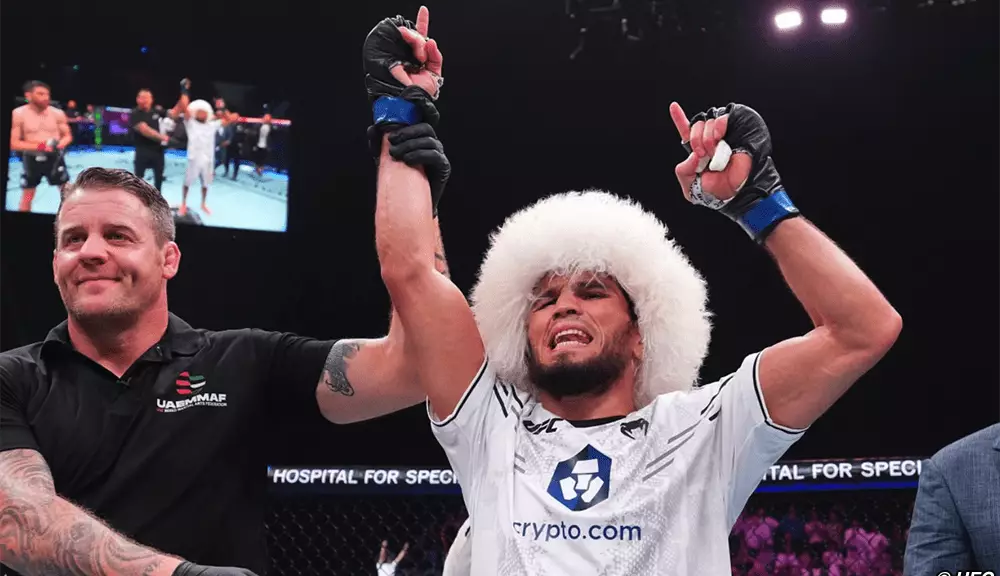The debate surrounding Umar Nurmagomedov’s title shot in the UFC bantamweight division has ignited contrasting opinions, particularly from champion Merab Dvalishvili. Dvalishvili has openly expressed his belief that Nurmagomedov, currently undefeated at 18-0 in mixed martial arts, should not be granted the title opportunity slated for UFC 311 on January 18 in Inglewood, Calif. This discourse not only raises questions about the criteria for title shots but also highlights the often opaque decision-making processes in the UFC’s matchmaking system.
Dvalishvili’s assertions rest on the premise that better-qualified contenders exist within the division. The bantamweight landscape is rife with fighters whom many believe have demonstrated more significant skills or have faced tougher opponents. Dvalishvili’s perspective resonates with a segment of the fanbase that feels Nurmagomedov’s path to a title shot lacks legitimacy. His record, while impressive, does not seem to reflect the level of competition that others in the division have consistently faced, further fueling the debate about what qualifies a fighter for a shot at the championship.
Contender Javier Mendez, who trains Nurmagomedov, countered Dvalishvili’s claims by referencing a prior statement from the UFC designating the winner of the fight between Nurmagomedov and Cory Sandhagen as the next title contender. Mendez urged that the UFC’s own words should hold weight in their decision-making, suggesting that contractually promised opportunities should not simply be discarded following the outcome of a fight. This highlights the inconsistency often seen in combat sports matchmaking, where promotional agendas can overshadow logical progression for title challenges.
As the debate continues, some critics posit that Dvalishvili’s vocal opposition to Nurmagomedov stems from a fear of potentially losing his title. Mendez, however, refutes this notion, insisting that a true champion possesses the courage to face any challenger. This narrative, whether true or not, emphasizes the psychological warfare prevalent in high-stakes combat sports. When stakes are this high, the lines between strategy, respect, and rivalry often become blurred, transforming exchanges into public spectacles that entertain far beyond the cage.
Mixed martial arts, especially at the UFC level, often see champions embroiled in discussions about legitimacy, skill, and reputation. Dvalishvili’s reputation as a skilled grappler may contribute to the air of anxiety regarding his belt, particularly if he perceives Nurmagomedov as a serious threat. Yet, arguments centering around ‘fear’ can detract from the more nuanced discussion about which fighters are most deserving and how potential matchups shape the evolving landscape of the division.
From a technical standpoint, the matchup between Dvalishvili and Nurmagomedov promises to be a fascinating clash of styles. Dvalishvili has gained notoriety for his superior wrestling ability, famously outwrestling Olympic champion Henry Cejudo in a high-profile bout. This grappling pedigree is crucial, as Nurmagomedov’s base is heavily derived from wrestling and sambo, coming from a revered lineage of Dagestani fighters. Mendez asserts that Nurmagomedov will hold an advantage in striking and grappling, although acknowledges that the endurance of Dvalishvili could prove challenging.
This impending fight at UFC 311 is set against the backdrop of wrestling supremacy in MMA, where grappling intricacies can often dictate the pace and outcome of matches. Mendez’s strategy emphasizes the necessity for his fighter to demonstrate versatility, engaging in both grappling and striking exchanges to exploit weaknesses in Dvalishvili’s game. This dual approach underscores the complexities of such high-level athletics, where adaptation is essential and the consequences of not doing so may cost a fighter dearly.
The controversy surrounding Umar Nurmagomedov’s title shot epitomizes the broader issues facing elite combat sports today. As the discourse unfolds, both promoters and fighters must navigate the maze of fan expectations, championship legitimacy, and personal ambition. With UFC 311 on the horizon, only time will tell whether Nurmagomedov can cement his place as a deserving contender or if Dvalishvili will successfully defend his perception of meritocracy in the division. Ultimately, these narratives shape the future of the sport, highlighting the fine line between civil competition and brimming rivalries among the best in the world.

